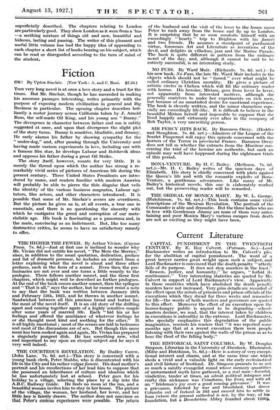Current Literature
CAPITAL PUNISHMENT IN THE TWENTIETH CENTURY. By E. Roy Calvert. (Putnam. 5s.)—Lord Buckmaster writes an introduction to Mr. Calvert's plc:, for the abolition of capital punishment. The word of a great lawyer carries great weight upon such a subject, and Lord Buckmaster is convinced that the death penalty " utterly fails of its purpose. It does not stop murders in the least." " Reason, justice, and humanity," he argues, " forbid iti continuance." Very interesting statistics are quoted by Mr. Calvert in support of Lord Buckrnaster's view. Apparently in those countries which have abolished the death penalty murders have not increased. Very grim details are recorded of the effect upon the minds of prisoners and prison officials of the executions which they dread for three weeks and remember for life—the words of both warders and governors are quoted to this effect. Moreover the effect of an execution upon the horror-hungry public is argued to be degrading—school- masters declare, we read, that the interest taken by children in executions is unhealthy in the extreme. Lord Buckmaster, who specially emphasizes this degradation of the public imagination, reminds his readers that "it was reported some months ago that at a recent execution there were people listening with their ears against the walls of the prison so as to hear the thud of the falling body."






























 Previous page
Previous page